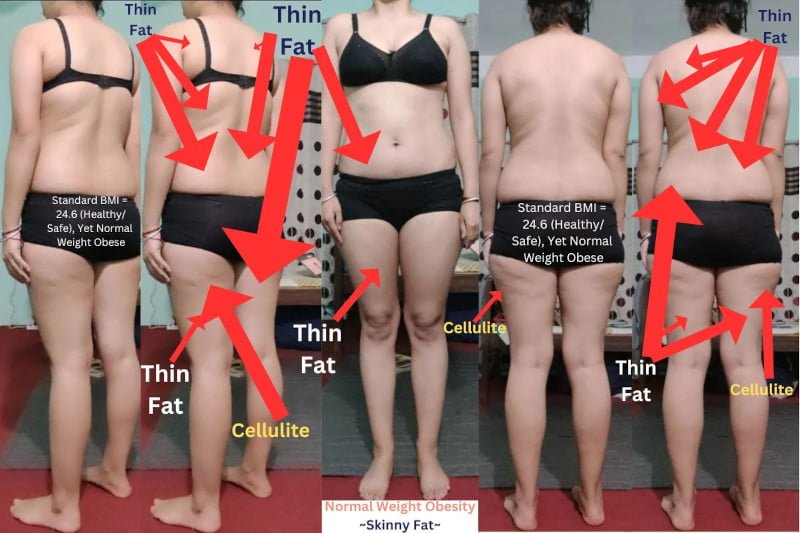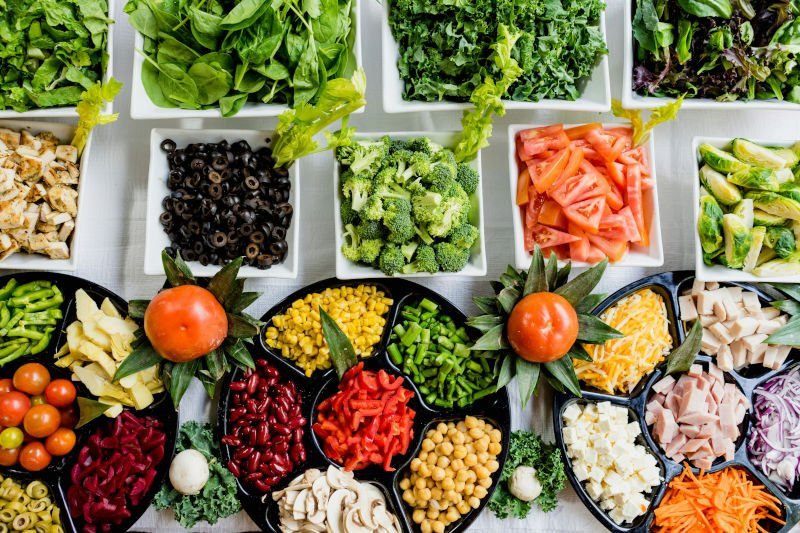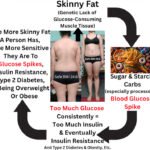How Skinny Fat Affects Regular Fat Weight Loss and Gain (Being Overweight and Obese)

The global obesity epidemic (1, 2) is raging out of control and forecast to get worse (3, 4). We know that diet, exercise, and lifestyle are main variables in understanding why. But, what is less understood is unique genetic body composition — muscle/mass, regular white/yellow fat, and skinny fat (thin fat, cellulite), no less. How skinny fat affects regular fat weight loss and gain directly influences being overweight or obese.
People experiencing skinny fat tissue where genetically they should have muscle mass are more prone to being overweight or obese. This is because regular fat tissue and skinny fat tissue burn fewer calories (5) at rest or when active than muscle tissue. Skinny fat and regular fat only burn an estimated 2-3 calories per pound per day (5), whereas muscle burns an estimated 6 calories per day per pound (5). The more genetic skinny fat tissue a person has, the more diligent they will have to be throughout their life with their diet, exercise, and lifestyle to keep being overweight or obese at bay.
How Skinny Fat Affects Regular Fat Weight Loss and Gain – The Source of Being Overweight and Obese

The typical Western Standard America Diet (6, 7, 8) is no help. Full of fast, junk, and processed foods, the Standard America Diet (SAD) is refined carbohydrates (sugar and starch), poor-quality fats, and low-quality protein that lacks proper nutrients while being loaded with chemicals. It is estimated that 60% of the average daily American diet consists of fast, junk, and processed food (9, 10, 11, 12). While roughly 40% of adults (13, 14) and 20% of children/adolescents (15, 13) are obese (BMI 30+).
Yet, Congress does nothing but pander to the lobbyists controlled by the companies perpetrating the transgressions. The fox is literally watching over the henhouse. Even more disconcerting, the food is specifically engineered to be this way so that it tastes delicious going down but fails to satiate and give the body the nutrients it requires.
The person experiences consistent blood sugar (glucose) spikes (16, 17, 18) followed by a crash, which invites insulin resistance and type 2 diabetes, eventually leading to being overweight and obese. Nutrient deficiency forces the body to crave more food, so the person is inclined to eat more and more. Which is intended to increase profits. The same companies that are destroying our health also control the “healthcare” drug companies (which cure and prevent nothing), ensuring that the profit loop is perpetual and complete (19, 20, 21).
Unique Genetic Body Composition – How Skinny Fat Affects Regular Fat Weight Loss and Gain
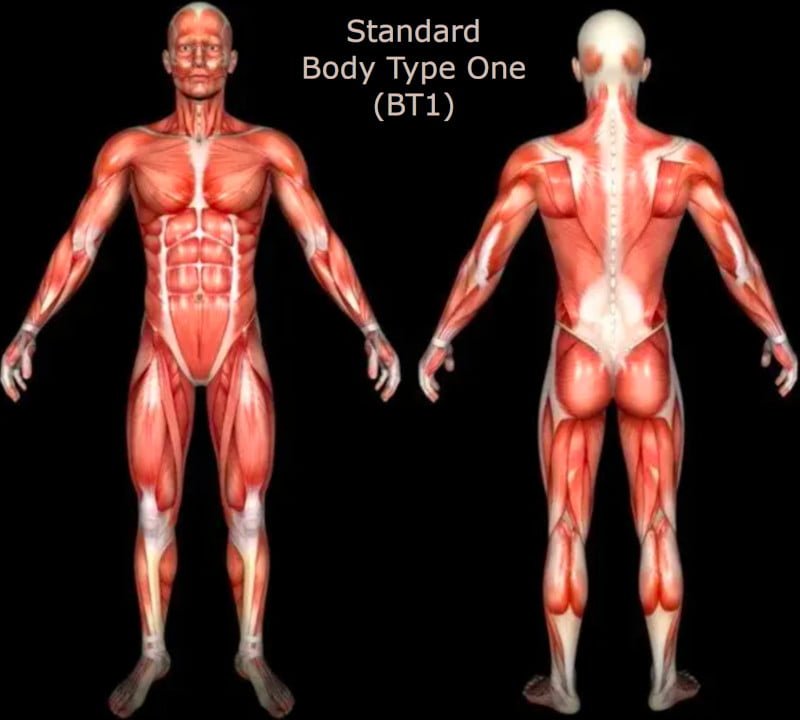 If you are genetically blessed with a Standard Body Type One (BT1) with all 600+ muscle developed, then you have a high metabolism because of all that muscle/mass, and the more calories you burn naturally (genetically). If you are further genetically blessed with the ALK Skinny Gene (22, 23, 24, 25, 26), then you can eat whatever you want and not worry about gaining any regular white/yellow fat weight. Especially the younger you are.
If you are genetically blessed with a Standard Body Type One (BT1) with all 600+ muscle developed, then you have a high metabolism because of all that muscle/mass, and the more calories you burn naturally (genetically). If you are further genetically blessed with the ALK Skinny Gene (22, 23, 24, 25, 26), then you can eat whatever you want and not worry about gaining any regular white/yellow fat weight. Especially the younger you are.
However, the more skinny fat you have on your body, the slower your metabolism and the harder it will be to keep the excess regular fat off 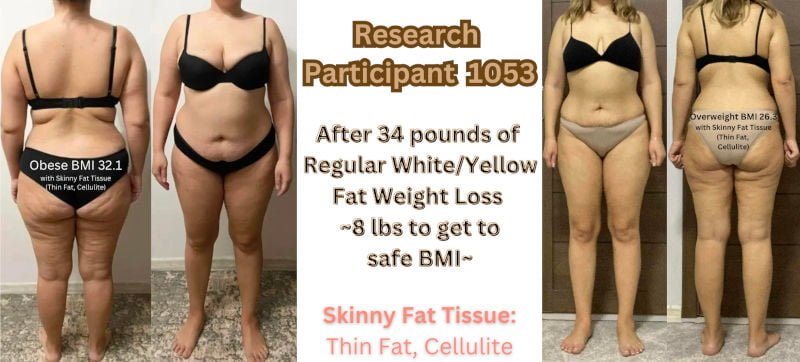 and avoid being overweight or obese. As well, the more regular fat that you have, the slower your metabolism. The slower your metabolism, the fewer calories you burn. And, the more likely it is that your unique body is less tolerant of garbage fast, junk, and processed foods full of empty-calorie and low-quality calorie garbage.
and avoid being overweight or obese. As well, the more regular fat that you have, the slower your metabolism. The slower your metabolism, the fewer calories you burn. And, the more likely it is that your unique body is less tolerant of garbage fast, junk, and processed foods full of empty-calorie and low-quality calorie garbage.
A Calorie Is Not A Calorie – The Best Skinny Fat Diet

A calorie is not a calorie (27, 28, 29, 30, 31); food type and quality matter. Although a safe calorie deficit is possible, calorie deficit and counting calories are not (32, 33, 34, 35) the best way to lose, manage, and maintain regular fat weight. A properly executed low-carb diet is the best scientific diet (36) for most people to manage skinny fat.
For acute regular fat weight loss, eat 37 grams (no less than 30)(36) of mostly fiber-focused carbs in relation to clean, high-quality calorie whole food, including high-quality protein and high-quality fat. You can add cardio and resistance exercises to speed things up. Once you safely lose the regular fat weight, eat 50 to 150 grams (36) of carbs per day, focusing on clean, whole foods and fiber carbs. Keep sugar carbs and starch carbs to a minimum.
Scientific Health Quizzes – Determine Skinny Fat (Genetic Body Composition)
Determining if you have skinny fat, where on your body, what types, and what you can do about it can be a tricky thing to figure out. Which is why we developed the Scientific Health Quizzes (free options) including the Scientific Body Type Quiz (Official), Scientific Metabolism Quiz Health Score, Scientific Diet Quiz Health Score, Scientific Exercise Quiz Health Score, and Scientific Lifestyle Quiz Health Score.
Each Quiz utilizes the latest scientific data, evidence, and facts in a proprietary algorithm to accurately calculate your unique metrics so you can understand your unique genetic body composition (and shape) along with your specific metabolism, diet, exercise, and lifestyle.
How the Skinny Fat Crisis Affects The Global Obesity Epidemic
References
- WebMD: Obesity Epidemic “Astronomical”, R. Morgan Griffin (Medically Reviewed by Michael W. Smith, MD). https://www.webmd.com/obesity/features/obesity-epidemic-astronomical
- World Health Organization (WHO): Obesity and overweight, March 1, 2024. https://www.who.int/activities/controlling-the-global-obesity-epidemic
- NIH, National Library of Medicine: By 2030, nearly half of all U.S. adults will be obese, experts predict, December 19, 2019, Melissa Healy (at The Los Angeles Times). https://www.ncbi.nlm.nih.gov/search/research-news/7943/
- Time: More Than Half of the World Will Be Obese By 2035, Report Says, March 21, 2023, Jeffrey Kluger. https://time.com/6264865/global-obesity-rates-increasing/
- Fellow One Research, Skinny Fat Science: How Skinny Fat Affects Metabolism, August 7, 2024, Dr. Skinny Fat. https://skinnyfat.fellowone.com/how-skinny-fat-affects-metabolism/
- NIH, National Library of Medicine: The Standard American Diet and its relationship to the health status of Americans, December 25, 2010, David Grotto and Elisa Zied. https://pubmed.ncbi.nlm.nih.gov/21139124/
- MedicalNewsToday: Western diet: How does it impact health?, October 27, 2023, Hannah Nichols (Medically reviewed by Kathy W. Warwick, RDN, CDCES, Nutrition). https://www.medicalnewstoday.com/articles/western-diet
- Yale School of Medicine: How the Standard American Diet Affects Your Brain, March 20, 2024, Serena Crawford. https://medicine.yale.edu/news-article/how-the-standard-american-diet-affects-your-brain/
- Centers for Disease Control and Prevention, CDC: Changes in Serving Size, Calories, and Sodium Content in Processed Foods From 2009 to 2015, March 15, 2018, Jenifer E. Clapp, MPA1; Sarah A. Niederman, MPH1; Elizabeth Leonard, MPH1; and Christine J. Curtis, MBA. https://www.cdc.gov/pcd/issues/2018/17_0265.htm
- New York Times: How to Help Americans Eat Less Junk Food, June 30, 2024. https://www.nytimes.com/2024/06/30/opinion/food-warning-labels-ultra-processed-food.html
- NYU: Americans Are Eating More Ultra-Processed Foods, October 14, 2021 (Modified Mar 21, 2023), Rachel Harrison. https://www.nyu.edu/about/news-publications/news/2021/october/ultra-processed-foods.html
- NIH, National Library of Medicine: Junk Food Intake Among Adults in the United States, July 5, 2021, Elizabeth K Dunford, Barry Popkin, and Shu Wen Ng. https://www.ncbi.nlm.nih.gov/pmc/articles/PMC8826924/
- Centers for Disease Control and Prevention, CDC: About Obesity, January 23, 2024. https://www.cdc.gov/obesity/php/about/index.html
- National Institute of Diabetes and Digestive and Kidney Diseases: Overweight & Obesity Statistics, https://www.niddk.nih.gov/health-information/health-statistics/overweight-obesity
- Cleveland Clinic: Childhood Obesity, February 21, 2024. https://my.clevelandclinic.org/health/diseases/9467-obesity-in-children
- Healthline: Junk Food and Diabetes, January 11, 2013, Linda Hepler, RN (Medically reviewed by Kathy W. Warwick, RDN, CDCES, Nutrition). https://www.healthline.com/health/type-2-diabetes/junk-food
- NIH, National Library of Medicine: The Hidden Dangers of Fast and Processed Food, April 3, 2018, Joel Fuhrman, MD. https://www.ncbi.nlm.nih.gov/pmc/articles/PMC6146358/
- MedicalNewsToday: Junk food and diabetes: Tips for eating out, April 5, 2019, Jayne Leonard (Medically reviewed by Natalie Olsen, R.D., L.D., ACSM EP-C). https://www.medicalnewstoday.com/articles/317122
- NIH, National Library of Medicine: Partnerships between health organizations and the food industry risk derailing public health nutrition, February 22, 2011, Yoni Freedhoff, MD and Paul C. Hébert, MD MHSc. https://www.ncbi.nlm.nih.gov/pmc/articles/PMC3042434/
- MedPage Today: Nutrition Group Has Close Ties to Food, Pharma Companies, October 24, 2022, Michael DePeau-Wilson. https://www.medpagetoday.com/special-reports/features/101396
- Mark Hyman MD: The Toxic Triad: How Big Food, Big Farming, and Big Pharma Spread Obesity, Diabetes, and Chronic Disease Across the Globe, October 22, 2010, Mark Hyman, MD. https://drhyman.com/blogs/content/the-toxic-triad-how-big-food-big-farming-and-big-pharma-spread-obesity-diabetes-and-chronic-disease-across-the-globe
- ScienceDaily: Scientists identify gene linked to thinness that may help resist weight gain, May 21, 2020. https://www.sciencedaily.com/releases/2020/05/200521112617.htm
- NIH, National Library of Medicine: Identification of ALK in Thinness, June 11, 2020, Michael Orthofer, Armand Valsesia, Reedik Mägi, Qiao-Ping Wang, Joanna Kaczanowska, Ivona Kozieradzki, Alexandra Leopoldi, Domagoj Cikes, Lydia M Zopf, Evgenii O Tretiakov, Egon Demetz, Richard Hilbe, Anna Boehm, Melita Ticevic, Margit Nõukas, Alexander Jais, Katrin Spirk, Teleri Clark , Sabine Amann , Maarja Lepamets , Christoph Neumayr , Cosmas Arnold , Zhengchao Dou , Volker Kuhn , Maria Novatchkova , Shane J F Cronin , Uwe J F Tietge, Simone Müller , J Andrew Pospisilik , Vanja Nagy , Chi-Chung Hui, Jelena Lazovic , Harald Esterbauer , Astrid Hagelkruys , Ivan Tancevski, Florian W Kiefer, Tibor Harkany, Wulf Haubensak, G Gregory Neely , Andres Metspalu , Jorg Hager, Nele Gheldof, and Josef M Penninger. https://pubmed.ncbi.nlm.nih.gov/32442405/
- CNN: Scientists say they may have found a skinny gene, May 21, 2020, Katie Hunt. https://www.cnn.com/2020/05/21/health/thin-gene-trnd-wellness/index.html
- Genetic Engineering and Biotechnology News: Gene for “Thinness” Identified that May Help to Resist Weight Gain, May 5, 2020, https://www.genengnews.com/news/gene-for-thinness-identified-that-may-help-to-resist-weight-gain/
- SciTechDaily: The Secret to Burning Fat? According to Scientists, These Special “Skinny Genes” Double Weight Loss, October 15 22024, The University of Essex. https://scitechdaily.com/the-secret-to-burning-fat-according-to-scientists-these-special-skinny-genes-double-weight-loss/
- Harvard Health Publishing: There’s no sugar-coating it: All calories are not created equal, November 4, 2016, Celia Smoak Spell, Assistant Editor. https://www.health.harvard.edu/blog/theres-no-sugar-coating-it-all-calories-are-not-created-equal-2016110410602
- Healthline: 6 Reasons Why a Calorie Is Not a Calorie. June 29, 2023, Kris Gunnars, BSc. https://www.healthline.com/nutrition/6-reasons-why-a-calorie-is-not-a-calorie
- NIH, National Library of Medicine: Is a Calorie Really a Calorie? Metabolic Advantage of Low-Carbohydrate Diets, December 31, 2004 Anssi H Manninen. https://www.ncbi.nlm.nih.gov/pmc/articles/PMC2129158/
- BioMed Central (BMC): “A calorie is a calorie” violates the second law of thermodynamics, July 28, 2004, Richard D Feinman and Eugene J Fine. https://nutritionj.biomedcentral.com/articles/10.1186/1475-2891-3-9
- The Conversation: Not all calories are equal – a dietitian explains the different ways the kinds of foods you eat matter to your body, December 27, 2021, Terezie Tolar-Peterson. https://theconversation.com/not-all-calories-are-equal-a-dietitian-explains-the-different-ways-the-kinds-of-foods-you-eat-matter-to-your-body-156900
- Harvard Health Publishing: Don’t count calories, but be aware of them, October 20, 2013. https://www.health.harvard.edu/healthbeat/dont-count-calories-but-be-aware-of-them
- NBC, Today Show: Want to lose weight? Doctors say it’s time to stop counting calories, June 06, 2022. https://www.nbc.com/today/video/want-to-lose-weight-doctors-say-its-time-to-stop-counting-calories/NBCN511237910
- Harvard Health Publishing: Stop counting calories, October 1, 2020. https://www.health.harvard.edu/staying-healthy/stop-counting-calories
- NIH, National Library of Medicine: Reducing Calorie Intake May Not Help You Lose Body Weight, June 28, 2017, David Benton and Hayley A. Young. https://www.ncbi.nlm.nih.gov/pmc/articles/PMC5639963/
- Skinny Fat Science: The Best Skinny Fat Diet, According to Science, July 29, 2024. https://skinnyfat.fellowone.com/the-best-skinny-fat-diet-according-to-science/


